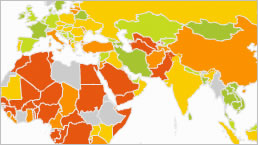Financial inclusion for poor households and microbusinesses may not be the first thing that comes to mind when thinking about the Basel Committee on Banking Supervision, the Committee on Payment and Settlement Systems, the Financial Action Task Force, the International Association of Deposit Insurers, and the International Association of Insurance Supervisors. Yet these global standard-setting bodies (SSBs) have significant influence on how many get access to what range and quality of formal financial services and at what cost. While the roles of each differ, all five of these bodies are increasingly engaged on the subject. CGAP has released this white paper on behalf of the GPFI, which aims to raise awareness and frame issues to inform ongoing work by these five SSBs to integrate financial inclusion into normative standards and advisory guidance that can be effectively applied at the country level.
Embracing the goal of full financial inclusion represents a potentially significant shift of focus for the SSBs, and requires a commensurate evolution in thinking. And they are at different stages in this evolution. Some of the issues to be considered are specific to the mandate of each SSB, while others are jointly relevant to multiple SSBs. On both types of issues, joint engagement offers them the opportunity to understand each other’s perspective and to learn from each other. It also holds the promise of standards and guidance that help country level policy makers balance priorities as they pursue a broad financial inclusion agenda. “Global Standard-Setting Bodies and Financial Inclusion for the Poor” considers both issues specific to the mandates of the five bodies, and three key financial inclusion topics of relevance to multiple standard-setting bodies: formalization of informal providers, consumer protection, and branchless banking.
The paper concludes with general observations and specific recommendations for further engagement on financial inclusion with respect to the standards and guidance of each. The SSBs (including their members and observers and their secretariats) are the primary audience. But given their limited resources, the observations and the recommendations are also relevant for a broader audience who may be well-positioned to undertake the recommended activities on their own or in partnership with the SSBs.


